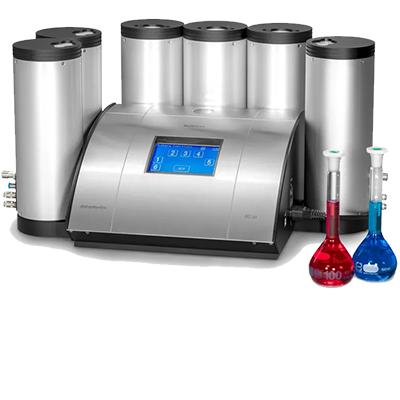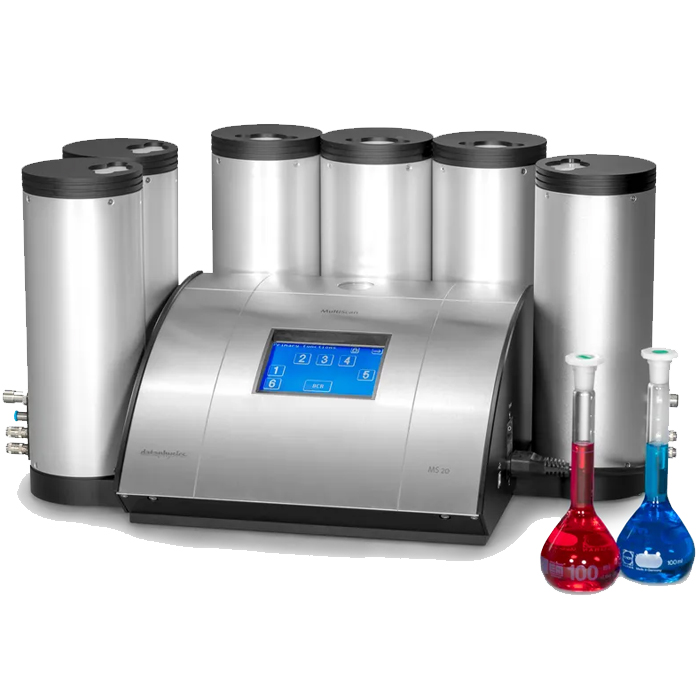MS-MultiScan dispersion stability analysis system

The MS MultiScan dispersion stability analysis system is a compact and versatile measuring device for the optical stability and aging analysis of a variety of multi-phase dispersions, in particular suspensions and emulsions. In the following you will learn what dispersions are and which possible destabilisation mechanisms exist as well as how dispersion stability analysis can evaluate these processes in the MS 20.
Dispersions are multi-phase mixtures consisting of substances that are insoluble in one another. One phase is the continuous phase in which small particles of the other phase are dispersed. A suspension consists of a liquid continuous phase and dispersed solid particles. In an emulsion the dispersed particles are small droplets of another liquid, and a foam consists of a liquid continuous phase and dispersed gas bubbles.
Dispersions are encountered in everyday life in many different products, ranging from salad dressings and cocktails in the food sector, emulsions and creams in cosmetic and pharmaceutical products to multi-phased cleaning agents, emulsion paint or seal slurry in the building industry, to name just a few examples. For all these products the dispersion stability is an extremely important factor that has to be analysed and optimised during product development.
Beer, as is well known, differs by amount of alcohol, recipe and taste. However, a mindful observer might also notice different dispersion behaviour as there are brands that have smaller or larger foam heads with smaller or larger gas bubbles that are stable for a longer or shorter period of time. In unfiltered beer the suspended particles that are responsible for the inherent turbidity sediment over time. And anyone who takes a close look at a famous Irish beer notes that gas bubbles sediment at the glass instead of rising as usual. This effect is caused by the unique combination of distinct glass shape and mixture of nitrogen and carbon dioxide.

Over time destabilisation processes take place inside dispersions: the dispersed particles can sediment or cream due to gravity. Moreover phase separation occurs because of the interfacial tension: the dispersed particles cluster or merge in order to minimise their interfacial area to the surrounding continuous phase.
The dispersion stability analysis utilises an optical measuring procedure: with two light sources and a detector, the light transmitted through and scattered back by the dispersion sample is analysed. The transmission and backscattering intensities directly depend on the number, size and type of dispersed particles. Hence the light intensity changes while the dispersion destabilises and, for example, particles disappear from the light path due to sedimentation or become bigger due to clustering. Stability analysis tracks these changes by measuring the sample again and again for a certain experiment duration. During the measurement the whole sample height is scanned, hence also local changes in the sample are detected.
The MultiScan MS 20 is the measuring device for the automatic optical stability and aging analysis of liquid dispersions, in particular suspensions and emulsions, and the comprehensive characterisation of time- and temperature-dependent destabilisation mechanisms. It consists of a base unit and up to six connected ScanTowers with temperature-controlled sample chambers.
The base unit of the MS 20 features an integrated touch screen that displays status information and can be used to control important base functions. Additionally it is possible to register the studied samples, fast and conveniently, with the built-in or optional handheld barcode scanner.
The ScanTowers of the MS 20 can be individually controlled and operated at different temperatures. Electric heating, with liquid counter cooling, allows for measurements in a temperature range of -10 °C to 80 °C.

The intuitive MSC control and evaluation software supports you in the use of the MS 20.
Learn more about the MSC software.
Due to the modular product design the MS 20 can be combined with a multitude of accessories.